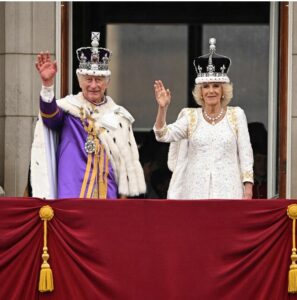Inevitably, the coronation of Charles III has focused many minds in the UK on issues surrounding the inheritance of wealth, power and privilege. Notably, it prompted the Guardian newspaper to undertake a detailed analysis of just how much the new king is worth, in strictly monetary terms and how much he costs his subjects. The results have been surprising, and shocking, but equally surprising, and shocking is the extent to which such information has been, and still is, concealed from those who, ultimately are paying the bills. That secrecy has been very necessary, because what it has hidden is almost impossible to justify.

The new king and queen. The pantomime costumes and remarkably silly hats are distractions from the uglier underlying reality of a country at odds with itself.
Inherited wealth is also, of course, a real problem for the followers of Ayn Rand. Not even she was so stupid as to suppose that the superhuman powers of her ‘rational men’ (and occasional women) would necessarily appear in their children, if any. The Taggart bloodline, which began with Nathaniel Taggart in the 1860s, seems to have run strong in his son and his grandson and thence to his great grand-daughter, Dagny, but she shared her inheritance in Taggart Transcontinental with her worthless and corrupt brother James. The sanctity of private property trumped all else, and in Atlas Shrugged Rand made just one ineffectual attempt to resolve the problem. She had John Galt say:
“Only a man who does not need it is fit to inherit wealth – the man who would make his own fortune no matter where he started. If an heir is equal to his money, it serves him, if not it destroys him. But you look on and you cry that money corrupted him. Did it? Or did he corrupt his money? Do not envy a worthless heir, his wealth is nor yours and you would have done no better with it. Do not think that it would have been distributed among you; loading the world with fifty parasites instead of one, would nor bring back the dead virtue which was the fortune. Money is a living power that dies without its root. Money will not serve the mind that cannot match it. Is this the reason why you call it evil?”
A remarkable thing about this (although the more one reads Rand, the less remarkable it becomes) is the focus on money, but money is not the only thing that can be inherited. One thing the Guardian’s researchers have made clear is that that among the items that that the British royals have inherited, in quite obscene amounts, are land and property. The ownership is tied up in a maze of opaque arrangements involving institutions such as the Duchies of Cornwall and Lancaster with status that is unclear in almost every respect except one, that one being their exemption from taxation. The personal wealth of Charles III is estimated at £1,800,000,000, and is increasing year by year. Is it destroying him and his family? Looking at the dubious dealings of the disgraced of Andrew and the open feud between William and Harry, it certainly seems that something is destroying them, and perhaps it is their money, but however dysfunctional the house of Hanover-Windsor may be in some respects, it has throughout the ages shown considerable skill and expertise in hanging on to both position and property. The sad thing is that, in propping up the whole ridiculous pantomime of lords and ladies, with its myriad paths to patronage and corruption, they have ensured the preservation in the British state of a dysfunctional governmental system completely lacking in formal checks and balances on the power of autocracy.
The lesson here is rather different from the one that Rand would have us accept, and that even in her own novels she could not completely hide. In Atlas Shrugged only John Galt is a God-like master of everything. Dagny Taggart could run a railway, but she lacked the negotiating skills needed to deal with a hostile government. James Taggart had those skills, but lacked the ability to run a railway. Together, they could have been a powerful team, but in opposing each other at every turn they destroyed Taggart Transcontinental. In their joint story are demonstated the two fatal flaws in Rand’s position. The first is that human societis require cooperation between people of different abilities, because no one person can do everything well.The second is that if the two of them, unable to cooperate, had inherited money and only money, it might have mattered little if they destroyed each other, but money is power, and they had inherited a railway. All those lost jobs, all that lost infrastructure, all those people who needed to get from one place to another and were unable to do so, to Rand these were merely irrelevant collateral damage, a necessary element in a world that would allow her ‘rational men’ to flourish. Or, since they had all been helpless without John Galt to organise them, to allow one man and his cronies to flourish.
